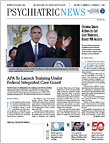At the end of each year, NEJM Journal Watch Psychiatry releases a list of the 10 most clinically important research articles in a variety of medical disciplines, including psychiatry. For the 2015 edition, the American Journal of Psychiatry (AJP) led the field with four selections, while no other journal featured more than one study in the top 10.
While this is a notable accomplishment, it should also be pointed out that this is not a new phenomenon; 2015 represents the fourth straight year that AJP was the most cited journal by the NEJM Journal Watch Psychiatry editors who select the year’s top stories.
“The predominance of AJP in this top-10 list reinforces that this journal publishes landmark studies that inform and advance the clinical practice of psychiatry, as well as those that provide direction for future discoveries and advances,” said AJP Editor Robert Freedman, M.D., a professor and chair of the Department of Psychiatry at the University of Colorado Anschultz Medical Campus.
“We are honored to once again be highly recognized by NEJM Journal Watch Psychiatry, and we hope this distinction will encourage both readers and potential authors to continue to see AJP as the definitive source for mental health research.”
Freedman noted that the four articles cited in the top 10 list showcase the breadth of research covered in AJP:
Helen Lavretsky, M.D., and colleagues found that combining citalopram with methylphenidate improved the response of geriatric patients with depression.
John Kane, M.D., and colleagues described the effectiveness of NAVIGATE—a multifaceted, specialty-care program that combines personalized medication management, resilience-based behavioral therapy, family psychoeducation, and support for employment and education—at improving functional and clinical outcomes after first-episode psychosis (
Psychiatric News, November 20, 2015).
Terrie Moffitt, M.D., and colleagues provided new evidence related to the issue of adult-onset attention-deficit/hyperactivity disorder (ADHD). Their analysis found that adults with ADHD do not share many of the neuropsychiatric characteristics of childhood ADHD and frequently have no childhood history of the disorder (
Psychiatric News, July 3, 2015).
Richard Wesseloo, M.D., and colleagues carried out a meta-analysis that found a higher risk of postpartum relapse in women with a previous history of postpartum psychosis than those with a history of bipolar disorder. The study also found that patients with bipolar disorder appear to benefit from receiving medication during pregnancy and after delivery, as do patients with histories of postpartum psychosis who receive lithium following delivery. ■
The list of the top 10 psychiatry articles from 2015 as selected by
NEJM Journal Watch Psychiatry can be accessed
here.
